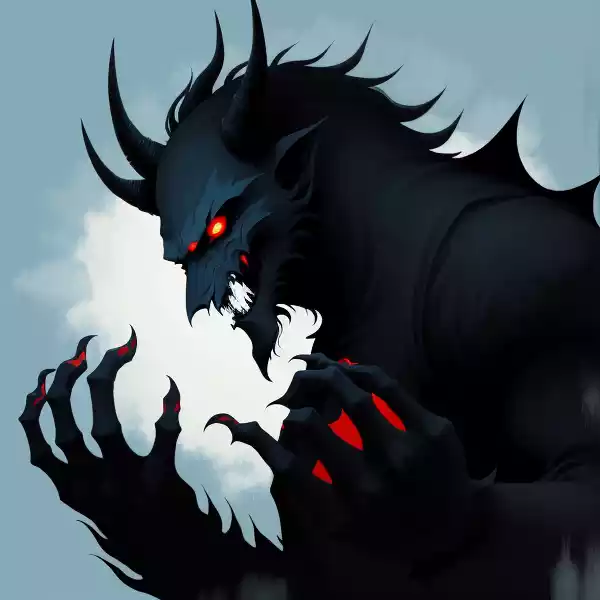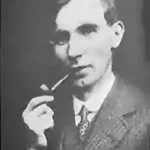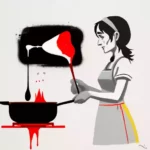 | |
The Beast with Five Fingers | |
| Author | W. F. Harvey |
|---|---|
| Published |
1919
|
| Language | English |
| Nationality | British |
| Genre | Horror, Supernatural Fiction |
1919 Short Story
The Beast with Five Fingers
The Beast with Five Fingers is an English Horror, Supernatural Fiction short story by British writer W. F. Harvey. It was first published in 1919. The Beast with Five Fingers (1919) is featured in our collection of Halloween Stories and Gothic Literature Study Guide. You may also enjoy our Gothic, Ghost, Horror and Weird Library
The Beast with Five Fingers
by W. F. Harvey
When I was a little boy I once went with my father to call on Adrian Borlsover. I played on the floor with a black spaniel while my father appealed for a subscription. Just before we left my father said, “Mr. Borlsover, may my son here shake hands with you? It will be a thing to look back upon with pride when he grows to be a man.”
I came up to the bed on which the old man was lying and put my hand in his, awed by the still beauty of his face. He spoke to me kindly, and hoped that I should always try to please my father. Then he placed his right hand on my head and asked for a blessing to rest upon me. “Amen!” said my father, and I followed him out of the room, feeling as if I wanted to cry. But my father was in excellent spirits.
“That old gentleman, Jim,” said he, “is the most wonderful man in the whole town. For ten years he has been quite blind.”
“But I saw his eyes,” I said. “They were ever so black and shiny; they weren’t shut up like Nora’s puppies. Can’t he see at all?”
And so I learnt for the first time that a man might have eyes that looked dark and beautiful and shining without being able to see.
“Just like Mrs. Tomlinson has big ears,” I said, “and can’t hear at all except when Mr. Tomlinson shouts.”
“Jim,” said my father, “it’s not right to talk about a lady’s ears. Remember what Mr. Borlsover said about pleasing me and being a good boy.”
That was the only time I saw Adrian Borlsover. I soon forgot about him and the hand which he laid in blessing on my head. But for a week I prayed that those dark tender eyes might see.
“His spaniel may have puppies,” I said in my prayers, “and he will never be able to know how funny they look with their eyes all closed up. Please let old Mr. Borlsover see.”
Adrian Borlsover, as my father had said, was a wonderful man. He came of an eccentric family. Borlsovers’ sons, for some reason, always seemed to marry very ordinary women, which perhaps accounted for the fact that no Borlsover had been a genius, and only one Borlsover had been mad. But they were great champions of little causes, generous patrons of odd sciences, founders of querulous sects, trustworthy guides to the bypath meadows of erudition.
Adrian was an authority on the fertilization of orchids. He had held at one time the family living at Borlsover Conyers, until a congenital weakness of the lungs obliged him to seek a less rigorous climate in the sunny south coast watering-place where I had seen him. Occasionally he would relieve one or other of the local clergy. My father described him as a fine preacher, who gave long and inspiring sermons from what many men would have considered unprofitable texts. “An excellent proof,” he would add, “of the truth of the doctrine of direct verbal inspiration.”
Adrian Borlsover was exceedingly clever with his hands. His penmanship was exquisite. He illustrated all his scientific papers, made his own woodcuts, and carved the reredos that is at present the chief feature of interest in the church at Borlsover Conyers. He had an exceedingly clever knack in cutting silhouettes for young ladies and paper pigs and cows for little children, and made more than one complicated wind instrument of his own devising.
When he was fifty years old Adrian Borlsover lost his sight. In a wonderfully short time he had adapted himself to the new conditions of life. He quickly learned to read Braille. So marvelous indeed was his sense of touch that he was still able to maintain his interest in botany. The mere passing of his long supple fingers over a flower was sufficient means for its identification, though occasionally he would use his lips. I have found several letters of his among my father’s correspondence. In no case was there anything to show that he was afflicted with blindness and this in spite of the fact that he exercised undue economy in the spacing of lines. Towards the close of his life the old man was credited with powers of touch that seemed almost uncanny: it has been said that he could tell at once the color of a ribbon placed between his fingers. My father would neither confirm nor deny the story.
I
Adrian Borlsover was a bachelor. His elder brother George had married late in life, leaving one son, Eustace, who lived in the gloomy Georgian mansion at Borlsover Conyers, where he could work undisturbed in collecting material for his great book on heredity.
Like his uncle, he was a remarkable man. The Borlsovers had always been born naturalists, but Eustace possessed in a special degree the power of systematizing his knowledge. He had received his university education in Germany, and then, after post-graduate work in Vienna and Naples, had traveled for four years in South America and the East, getting together a huge store of material for a new study into the processes of variation.
He lived alone at Borlsover Conyers with Saunders his secretary, a man who bore a somewhat dubious reputation in the district, but whose powers as a mathematician, combined with his business abilities, were invaluable to Eustace.
Uncle and nephew saw little of each other. The visits of Eustace were confined to a week in the summer or autumn: long weeks, that dragged almost as slowly as the bath-chair in which the old man was drawn along the sunny sea front. In their way the two men were fond of each other, though their intimacy would doubtless have been greater had they shared the same religious views. Adrian held to the old-fashioned evangelical dogmas of his early manhood; his nephew for many years had been thinking of embracing Buddhism. Both men possessed, too, the reticence the Borlsovers had always shown, and which their enemies sometimes called hypocrisy. With Adrian it was a reticence as to the things he had left undone; but with Eustace it seemed that the curtain which he was so careful to leave undrawn hid something more than a half-empty chamber.
Two years before his death Adrian Borlsover developed, unknown to himself, the not uncommon power of automatic writing. Eustace made the discovery by accident. Adrian was sitting reading in bed, the forefinger of his left hand tracing the Braille characters, when his nephew noticed that a pencil the old man held in his right hand was moving slowly along the opposite page. He left his seat in the window and sat down beside the bed. The right hand continued to move, and now he could see plainly that they were letters and words which it was forming.
“Adrian Borlsover,” wrote the hand, “Eustace Borlsover, George Borlsover, Francis Borlsover Sigismund Borlsover, Adrian Borlsover, Eustace Borlsover, Saville Borlsover. B, for Borlsover. Honesty is the Best Policy. Beautiful Belinda Borlsover.”
“What curious nonsense!” said Eustace to himself.
“King George the Third ascended the throne in 1760,” wrote the hand. “Crowd, a noun of multitude; a collection of individualsAdrian Borlsover, Eustace Borlsover.”
“It seems to me,” said his uncle, closing the book, “that you had much better make the most of the afternoon sunshine and take your walk now.” “I think perhaps I will,” Eustace answered as he picked up the volume. “I won’t go far, and when I come back I can read to you those articles in Nature about which we were speaking.”
He went along the promenade, but stopped at the first shelter, and seating himself in the corner best protected from the wind, he examined the book at leisure. Nearly every page was scored with a meaningless jungle of pencil marks: rows of capital letters, short words, long words, complete sentences, copy-book tags. The whole thing, in fact, had the appearance of a copy-book, and on a more careful scrutiny Eustace thought that there was ample evidence to show that the handwriting at the beginning of the book, good though it was was not nearly so good as the handwriting at the end.
He left his uncle at the end of October, with a promise to return early in December. It seemed to him quite clear that the old man’s power of automatic writing was developing rapidly, and for the first time he looked forward to a visit that combined duty with interest.
But on his return he was at first disappointed. His uncle, he thought, looked older. He was listless too, preferring others to read to him and dictating nearly all his letters. Not until the day before he left had Eustace an opportunity of observing Adrian Borlsover’s new-found faculty.
The old man, propped up in bed with pillows, had sunk into a light sleep. His two hands lay on the coverlet, his left hand tightly clasping his right. Eustace took an empty manuscript book and placed a pencil within reach of the fingers of the right hand. They snatched at it eagerly; then dropped the pencil to unloose the left hand from its restraining grasp.
“Perhaps to prevent interference I had better hold that hand,” said Eustace to himself, as he watched the pencil. Almost immediately it began to write.
“Blundering Borlsovers, unnecessarily unnatural, extraordinarily eccentric, culpably curious.”
“Who are you?” asked Eustace, in a low voice.
“Never you mind,” wrote the hand of Adrian.
“Is it my uncle who is writing?”
“Oh, my prophetic soul, mine uncle.”
“Is it anyone I know?”
“Silly Eustace, you’ll see me very soon.”
“When shall I see you?”
“When poor old Adrian’s dead.”
“Where shall I see you?”
“Where shall you not?”
Instead of speaking his next question, Borlsover wrote it. “What is the time?”
The fingers dropped the pencil and moved three or four times across the paper. Then, picking up the pencil, they wrote:
“Ten minutes before four. Put your book away, Eustace. Adrian mustn’t find us working at this sort of thing. He doesn’t know what to make of it, and I won’t have poor old Adrian disturbed. Au revoir.”
Adrian Borlsover awoke with a start.
“I’ve been dreaming again,” he said; “such queer dreams of leaguered cities and forgotten towns. You were mixed up in this one, Eustace, though I can’t remember how. Eustace, I want to warn you. Don’t walk in doubtful paths. Choose your friends well. Your poor grandfather”
A fit of coughing put an end to what he was saying, but Eustace saw that the hand was still writing. He managed unnoticed to draw the book away. “I’ll light the gas,” he said, “and ring for tea.” On the other side of the bed curtain he saw the last sentences that had been written.
“It’s too late, Adrian,” he read. “We’re friends already; aren’t we, Eustace Borlsover?”
On the following day Eustace Borlsover left. He thought his uncle looked ill when he said good-by, and the old man spoke despondently of the failure his life had been.
“Nonsense, uncle!” said his nephew. “You have got over your difficulties in a way not one in a hundred thousand would have done. Every one marvels at your splendid perseverance in teaching your hand to take the place of your lost sight. To me it’s been a revelation of the possibilities of education.”
“Education,” said his uncle dreamily, as if the word had started a new train of thought, “education is good so long as you know to whom and for what purpose you give it. But with the lower orders of men, the base and more sordid spirits, I have grave doubts as to its results. Well, good-by, Eustace, I may not see you again. You are a true Borlsover, with all the Borlsover faults. Marry, Eustace. Marry some good, sensible girl. And if by any chance I don’t see you again, my will is at my solicitor’s. I’ve not left you any legacy, because I know you’re well provided for, but I thought you might like to have my books. Oh, and there’s just one other thing. You know, before the end people often lose control over themselves and make absurd requests. Don’t pay any attention to them, Eustace. Good-by!” and he held out his hand. Eustace took it. It remained in his a fraction of a second longer than he had expected, and gripped him with a virility that was surprising. There was, too, in its touch a subtle sense of intimacy.
“Why, uncle!” he said, “I shall see you alive and well for many long years to come.”
Two months later Adrian Borlsover died.
II
Eustace Borlsover was in Naples at the time. He read the obituary notice in the Morning Post on the day announced for the funeral.
“Poor old fellow!” he said. “I wonder where I shall find room for all his books.”
The question occurred to him again with greater force when three days later he found himself standing in the library at Borlsover Conyers, a huge room built for use, and not for beauty, in the year of Waterloo by a Borlsover who was an ardent admirer of the great Napoleon. It was arranged on the plan of many college libraries, with tall, projecting bookcases forming deep recesses of dusty silence, fit graves for the old hates of forgotten controversy, the dead passions of forgotten lives. At the end of the room, behind the bust of some unknown eighteenth-century divine, an ugly iron corkscrew stair led to a shelf-lined gallery. Nearly every shelf was full.
“I must talk to Saunders about it,” said Eustace. “I suppose that it will be necessary to have the billiard-room fitted up with book cases.”
The two men met for the first time after many weeks in the dining-room that evening.
“Hullo!” said Eustace, standing before the fire with his hands in his pockets. “How goes the world, Saunders? Why these dress togs?” He himself was wearing an old shooting-jacket. He did not believe in mourning, as he had told his uncle on his last visit; and though he usually went in for quiet-colored ties, he wore this evening one of an ugly red, in order to shock Morton the butler, and to make them thrash out the whole question of mourning for themselves in the servants’ hall. Eustace was a true Borlsover. “The world,” said Saunders, “goes the same as usual, confoundedly slow. The dress togs are accounted for by an invitation from Captain Lockwood to bridge.”
“How are you getting there?”
“I’ve told your coachman to drive me in your carriage. Any objection?”
“Oh, dear me, no! We’ve had all things in common for far too many years for me to raise objections at this hour of the day.”
“You’ll find your correspondence in the library,” went on Saunders. “Most of it I’ve seen to. There are a few private letters I haven’t opened. There’s also a box with a rat, or something, inside it that came by the evening post. Very likely it’s the six-toed albino. I didn’t look, because I didn’t want to mess up my things but I should gather from the way it’s jumping about that it’s pretty hungry.”
“Oh, I’ll see to it,” said Eustace, “while you and the Captain earn an honest penny.”
Dinner over and Saunders gone, Eustace went into the library. Though the fire had been lit the room was by no means cheerful.
“We’ll have all the lights on at any rate,” he said, as he turned the switches. “And, Morton,” he added, when the butler brought the coffee, “get me a screwdriver or something to undo this box. Whatever the animal is, he’s kicking up the deuce of a row. What is it? Why are you dawdling?”
“If you please, sir, when the postman brought it he told me that they’d bored the holes in the lid at the post-office. There were no breathin’ holes in the lid, sir, and they didn’t want the animal to die. That is all, sir.”
“It’s culpably careless of the man, whoever he was,” said Eustace, as he removed the screws, “packing an animal like this in a wooden box with no means of getting air. Confound it all! I meant to ask Morton to bring me a cage to put it in. Now I suppose I shall have to get one myself.”
He placed a heavy book on the lid from which the screws had been removed, and went into the billiard-room. As he came back into the library with an empty cage in his hand he heard the sound of something falling, and then of something scuttling along the floor.
“Bother it! The beast’s got out. How in the world am I to find it again in this library!”
To search for it did indeed seem hopeless. He tried to follow the sound of the scuttling in one of the recesses where the animal seemed to be running behind the books in the shelves, but it was impossible to locate it. Eustace resolved to go on quietly reading. Very likely the animal might gain confidence and show itself. Saunders seemed to have dealt in his usual methodical manner with most of the correspondence. There were still the private letters.
What was that? Two sharp clicks and the lights in the hideous candelabra that hung from the ceiling suddenly went out.
“I wonder if something has gone wrong with the fuse,” said Eustace, as he went to the switches by the door. Then he stopped. There was a noise at the other end of the room, as if something was crawling up the iron corkscrew stair. “If it’s gone into the gallery,” he said, “well and good.” He hastily turned on the lights, crossed the room, and climbed up the stair. But he could see nothing. His grandfather had placed a little gate at the top of the stair, so that children could run and romp in the gallery without fear of accident. This Eustace closed, and having considerably narrowed the circle of his search, returned to his desk by the fire.
How gloomy the library was! There was no sense of intimacy about the room. The few busts that an eighteenth-century Borlsover had brought back from the grand tour, might have been in keeping in the old library. Here they seemed out of place. They made the room feel cold, in spite of the heavy red damask curtains and great gilt cornices.
With a crash two heavy books fell from the gallery to the floor; then, as Borlsover looked, another and yet another.
“Very well; you’ll starve for this, my beauty!” he said. “We’ll do some little experiments on the metabolism of rats deprived of water. Go on! Chuck them down! I think I’ve got the upper hand.” He turned once again to his correspondence. The letter was from the family solicitor. It spoke of his uncle’s death and of the valuable collection of books that had been left to him in the will.
“There was one request,” he read, “which certainly came as a surprise to me. As you know, Mr. Adrian Borlsover had left instructions that his body was to be buried in as simple a manner as possible at Eastbourne. He expressed a desire that there should be neither wreaths nor flowers of any kind, and hoped that his friends and relatives would not consider it necessary to wear mourning. The day before his death we received a letter canceling these instructions. He wished his body to be embalmed (he gave us the address of the man we were to employPennifer, Ludgate Hill), with orders that his right hand was to be sent to you, stating that it was at your special request. The other arrangements as to the funeral remained unaltered.”
“Good Lord!” said Eustace; “what in the world was the old boy driving at? And what in the name of all that’s holy is that?”
Someone was in the gallery. Someone had pulled the cord attached to one of the blinds, and it had rolled up with a snap. Someone must be in the gallery, for a second blind did the same. Someone must be walking round the gallery, for one after the other the blinds sprang up, letting in the moonlight.
“I haven’t got to the bottom of this yet,” said Eustace, “but I will do before the night is very much older,” and he hurried up the corkscrew stair. He had just got to the top when the lights went out a second time, and he heard again the scuttling along the floor. Quickly he stole on tiptoe in the dim moonshine in the direction of the noise, feeling as he went for one of the switches. His fingers touched the metal knob at last. He turned on the electric light.
About ten yards in front of him, crawling along the floor, was a man’s hand. Eustace stared at it in utter astonishment. It was moving quickly, in the manner of a geometer caterpillar, the fingers humped up one moment, flattened out the next; the thumb appeared to give a crab-like motion to the whole. While he was looking, too surprised to stir, the hand disappeared round the corner Eustace ran forward. He no longer saw it, but he could hear it as it squeezed its way behind the books on one of the shelves. A heavy volume had been displaced. There was a gap in the row of books where it had got in. In his fear lest it should escape him again, he seized the first book that came to his hand and plugged it into the hole. Then, emptying two shelves of their contents, he took the wooden boards and propped them up in front to make his barrier doubly sure.
“I wish Saunders was back,” he said; “one can’t tackle this sort of thing alone.” It was after eleven, and there seemed little likelihood of Saunders returning before twelve. He did not dare to leave the shelf unwatched, even to run downstairs to ring the bell. Morton the butler often used to come round about eleven to see that the windows were fastened, but he might not come. Eustace was thoroughly unstrung. At last he heard steps down below.
“Morton!” he shouted; “Morton!”
“Sir?”
“Has Mr. Saunders got back yet?”
“Not yet, sir.”
“Well, bring me some brandy, and hurry up about it. I’m up here in the gallery, you duffer.”
“Thanks,” said Eustace, as he emptied the glass. “Don’t go to bed yet, Morton. There are a lot of books that have fallen down by accident; bring them up and put them back in their shelves.”
Morton had never seen Borlsover in so talkative a mood as on that night. “Here,” said Eustace, when the books had been put back and dusted, “you might hold up these boards for me, Morton. That beast in the box got out, and I’ve been chasing it all over the place.”
“I think I can hear it chawing at the books, sir. They’re not valuable, I hope? I think that’s the carriage, sir; I’ll go and call Mr. Saunders.”
It seemed to Eustace that he was away for five minutes, but it could hardly have been more than one when he returned with Saunders. “All right, Morton, you can go now. I’m up here, Saunders.”
“What’s all the row?” asked Saunders, as he lounged forward with his hands in his pockets. The luck had been with him all the evening. He was completely satisfied, both with himself and with Captain Lockwood’s taste in wines. “What’s the matter? You look to me to be in an absolute blue funk.”
“That old devil of an uncle of mine,” began Eustace”oh, I can’t explain it all. It’s his hand that’s been playing old Harry all the evening. But I’ve got it cornered behind these books. You’ve got to help me catch it.”
“What’s up with you, Eustace? What’s the game?”
“It’s no game, you silly idiot! If you don’t believe me take out one of those books and put your hand in and feel.”
“All right,” said Saunders; “but wait till I’ve rolled up my sleeve. The accumulated dust of centuries, eh?” He took off his coat, knelt down, and thrust his arm along the shelf.
“There’s something there right enough,” he said. “It’s got a funny stumpy end to it, whatever it is, and nips like a crab. Ah, no, you don’t!” He pulled his hand out in a flash. “Shove in a book quickly. Now it can’t get out.”
“What was it?” asked Eustace.
“It was something that wanted very much to get hold of me. I felt what seemed like a thumb and forefinger. Give me some brandy.”
“How are we to get it out of there?”
“What about a landing net?”
“No good. It would be too smart for us. I tell you, Saunders, it can cover the ground far faster than I can walk. But I think I see how we can manage it. The two books at the end of the shelf are big ones that go right back against the wall. The others are very thin. I’ll take out one at a time, and you slide the rest along until we have it squashed between the end two.”
It certainly seemed to be the best plan. One by one, as they took out the books, the space behind grew smaller and smaller. There was something in it that was certainly very much alive. Once they caught sight of fingers pressing outward for a way of escape. At last they had it pressed between the two big books.
“There’s muscle there, if there isn’t flesh and blood,” said Saunders, as he held them together. “It seems to be a hand right enough, too. I suppose this is a sort of infectious hallucination. I’ve read about such cases before.”
“Infectious fiddlesticks!” said Eustace, his face white with anger; “bring the thing downstairs. We’ll get it back into the box.”
It was not altogether easy, but they were successful at last. “Drive in the screws,” said Eustace, “we won’t run any risks. Put the box in this old desk of mine. There’s nothing in it that I want. Here’s the key. Thank goodness, there’s nothing wrong with the lock.”
“Quite a lively evening,” said Saunders. “Now let’s hear more about your uncle.”
They sat up together until early morning. Saunders had no desire for sleep. Eustace was trying to explain and to forget: to conceal from himself a fear that he had never felt beforethe fear of walking alone down the long corridor to his bedroom.
III
“Whatever it was,” said Eustace to Saunders on the following morning, “I propose that we drop the subject. There’s nothing to keep us here for the next ten days. We’ll motor up to the Lakes and get some climbing.”
“And see nobody all day, and sit bored to death with each other every night. Not for me thanks. Why not run up to town? Run’s the exact word in this case, isn’t it? We’re both in such a blessed funk. Pull yourself together Eustace, and let’s have another look at the hand.”
“As you like,” said Eustace; “there’s the key.” They went into the library and opened the desk. The box was as they had left it on the previous night.
“What are you waiting for?” asked Eustace.
“I am waiting for you to volunteer to open the lid. However, since you seem to funk it, allow me. There doesn’t seem to be the likelihood of any rumpus this morning, at all events.” He opened the lid and picked out the hand.
“Cold?” asked Eustace.
“Tepid. A bit below blood-heat by the feel. Soft and supple too. If it’s the embalming, it’s a sort of embalming I’ve never seen before. Is it your uncle’s hand?”
“Oh, yes, it’s his all right,” said Eustace. “I should know those long thin fingers anywhere. Put it back in the box, Saunders. Never mind about the screws. I’ll lock the desk, so that there’ll be no chance of its getting out. We’ll compromise by motoring up to town for a week. If we get off soon after lunch we ought to be at Grantham or Stamford by night.”
“Right,” said Saunders; “and to-morrowOh, well, by to-morrow we shall have forgotten all about this beastly thing.”
If when the morrow came they had not forgotten, it was certainly true that at the end of the week they were able to tell a very vivid ghost story at the little supper Eustace gave on Hallow E’en.
“You don’t want us to believe that it’s true, Mr. Borlsover? How perfectly awful!”
“I’ll take my oath on it, and so would Saunders here; wouldn’t you, old chap?”
“Any number of oaths,” said Saunders. “It was a long thin hand, you know, and it gripped me just like that.”
“Don’t Mr. Saunders! Don’t! How perfectly horrid! Now tell us another one, do. Only a really creepy one, please!”
“Here’s a pretty mess!” said Eustace on the following day as he threw a letter across the table to Saunders. “It’s your affair, though. Mrs. Merrit, if I understand it, gives a month’s notice.”
“Oh, that’s quite absurd on Mrs. Merrit’s part,” Saunders replied. “She doesn’t know what she’s talking about. Let’s see what she says.”
“P.S.I should be obliged if you would give my respects to Mr. Saunders. I hope that he won’t run no risks with his cold.”
“Saunders,” said Eustace, “you’ve always had a wonderful way with you in dealing with servants. You mustn’t let poor old Merrit go.”
“Of course she shan’t go,” said Saunders. “She’s probably only angling for a rise in salary. I’ll write to her this morning.”
“No; there’s nothing like a personal interview. We’ve had enough of town. We’ll go back to-morrow, and you must work your cold for all it’s worth. Don’t forget that it’s got on to the chest, and will require weeks of feeding up and nursing.”
“All right. I think I can manage Mrs. Merrit.”
But Mrs. Merrit was more obstinate than he had thought. She was very sorry to hear of Mr. Saunders’s cold, and how he lay awake all night in London coughing; very sorry indeed. She’d change his room for him gladly, and get the south room aired. And wouldn’t he have a basin of hot bread and milk last thing at night? But she was afraid that she would have to leave at the end of the month.
“Try her with an increase of salary,” was the advice of Eustace.
It was no use. Mrs. Merrit was obdurate, though she knew of a Mrs. Handyside who had been housekeeper to Lord Gargrave, who might be glad to come at the salary mentioned.
“What’s the matter with the servants, Morton?” asked Eustace that evening when he brought the coffee into the library. “What’s all this about Mrs. Merrit wanting to leave?”
“If you please, sir, I was going to mention it myself. I have a confession to make, sir. When I found your note asking me to open that desk and take out the box with the rat, I broke the lock as you told me, and was glad to do it, because I could hear the animal in the box making a great noise, and I thought it wanted food. So I took out the box, sir, and got a cage, and was going to transfer it, when the animal got away.”
“What in the world are you talking about? I never wrote any such note.”
“Excuse me, sir, it was the note I picked up here on the floor on the day you and Mr. Saunders left. I have it in my pocket now.”
It certainly seemed to be in Eustace’s handwriting. It was written in pencil, and began somewhat abruptly.
“Get a hammer, Morton,” he read, “or some other tool, and break open the lock in the old desk in the library. Take out the box that is inside. You need not do anything else. The lid is already open. Eustace Borlsover.”
“And you opened the desk?”
“Yes, sir; and as I was getting the cage ready the animal hopped out.”
“What animal?”
“The animal inside the box, sir.”
“What did it look like?”
“Well, sir, I couldn’t tell you,” said Morton nervously; “my back was turned, and it was halfway down the room when I looked up.”
“What was its color?” asked Saunders; “black?”
“Oh, no, sir, a grayish white. It crept along in a very funny way, sir. I don’t think it had a tail.”
“What did you do then?”
“I tried to catch it, but it was no use. So I set the rat-traps and kept the library shut. Then that girl Emma Laidlaw left the door open when she was cleaning, and I think it must have escaped.”
“And you think it was the animal that’s been frightening the maids?”
“Well, no, sir, not quite. They said it wasyou’ll excuse me, sira hand that they saw. Emma trod on it once at the bottom of the stairs. She thought then it was a half-frozen toad, only white. And then Parfit was washing up the dishes in the scullery. She wasn’t thinking about anything in particular. It was close on dusk. She took her hands out of the water and was drying them absent-minded like on the roller towel, when she found that she was drying someone else’s hand as well, only colder than hers.”
“What nonsense!” exclaimed Saunders.
“Exactly, sir; that’s what I told her; but we couldn’t get her to stop.”
“You don’t believe all this?” said Eustace, turning suddenly towards the butler.
“Me, sir? Oh, no, sir! I’ve not seen anything.”
“Nor heard anything?”
“Well, sir, if you must know, the bells do ring at odd times, and there’s nobody there when we go; and when we go round to draw the blinds of a night, as often as not somebody’s been there before us. But as I says to Mrs. Merrit, a young monkey might do wonderful things, and we all know that Mr. Borlsover has had some strange animals about the place.”
“Very well, Morton, that will do.”
“What do you make of it?” asked Saunders when they were alone. “I mean of the letter he said you wrote.”
“Oh, th







